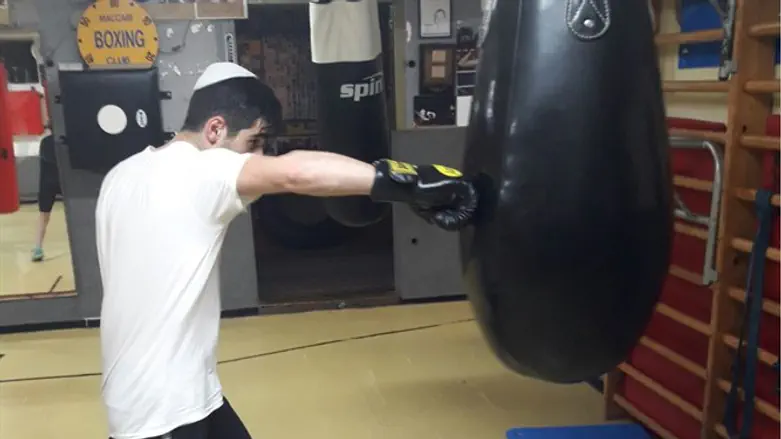
My name is Avishai Segal and I'm a 10th grade teacher at the Noam Yeshiva High School in Jerusalem. I wanted to share with you a story that happened to my student - Harel Tzion.
Harel has been practicing boxing for a long time. It began as a hobby and slowly began to move in the professional direction. A professional athlete requires many hours of training a week at the expense of other things.
This year Harel is in the 10th grade. The hours at the yeshiva high school are very long and almost every day ends in the late evening. At the beginning of the year Harel had a very difficult dilemma and he thought he would have to choose between continuing his yeshiva high school studies and boxing.
After he and the yeshiva performed a series of bureaucratic gymnastics, they managed to create a system that would suit him. This, of course, required Harel's willingness to invest more and more of his time and effort to close the learning gap for missed classes. (You have to see him come in to Thursday evening learning panting and sweating from his workout ...)
Two weeks ago, in Upper Nazareth, the Israel Junior Boxing Championship took place. The competition is organized by the State of Israel Boxing Association (not a private body), and the competition is divided according to weight and age. This is a very important competition, and as Harel puts it: "If someone wants to move forward, this is his chance. There, everyone's watching you."
Like with many sports competitions, the date for this competition was set for a Thursday-Friday-Saturday weekend. (Incidentally, last year the competition took place on the 14th day of Nissan, Pesach eve.)
Harel asked the organizers, "What happens if I get to the finals?" He was promised by the organizers that he could compete on Saturday night.
Harel is very talented (professional boxers say this about him as well), and he won the first rounds on Thursday. On Friday at 12:45, Shabbat Zachor eve, he won the semifinals and went on to the finals. He went to the organizers and told them, "I remind you that I'm a religious person and I can only compete on Saturday night."
They told him, "It's impossible, the games have an order and you can't change it; you have to compete on Saturday at noon." Harel told them that "he can't do it and if that's the way it is, he's going home."
The organizers didn't believe he would leave, and they told him "by the way" it would also hurt his future advancement.
Harel didn't give in; he returned to Jerusalem, arrived home three minutes before Shabbat and went to the synagogue.
Incidentally, there are three other small stories that illustrate how difficult it is for religious youth to compete in professional sports in the State of Israel:
Harel asked to compete while wearing tzitzit fringes. "My dream is to win the Olympics and to stand in the medals awarding ceremony wearing tzitzit," he said. Of course they didn't allow him to.
Last year when he came to a competition, the organizers told him he had to shave, and they handed him a razor blade. He told them, "No way, I do not shave that way; that's against halakha." They replied, "So you don't compete." No beseeching helped; he had to run to the barbershop to find a kosher shaver.(Jewish law forbids shaving with a razor, ed.)
Some of those who understand professional sports told him explicitly in a competition that "if he wants to move forward, he must leave religion."
When Harel first came to the meeting after the competition, I approached him curiously and asked him, "Well, what happened in the competition? You promised to update me." He showed me, "I came in second, but I didn't lose." I didn't understand, and asked him what he meant. Then he told me everything.
On the one hand, I was very excited; I was proud of his decision. Harel merited to sanctify Heaven, respect the Sabbath, and all of us in the yeshiva feel that way. It is possible to educate students to respect and preserve the holiness of the Sabbath by studying Halakhah, shiurim, conversations, etc., and it is possible to educate by sharing a story like this one.
On the other hand, this story is also infuriating. I serve not only as a high school yeshiva teacher but also a civics teacher. One of the things I try very hard to inculcate into the students is to see the State of Israel as a Jewish State, despite all the criticisms we have.
Can it be that in the State of Israel in its 70th year a religious person can't compete in professional sports?
Should someone in this type of situation have to face a dilemma - to be religious or a professional athlete?
What do you call this case, religionization or forced secularization?
Translated by Mordechai Sones.